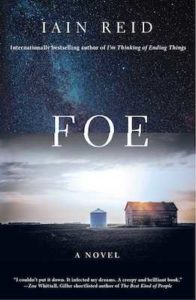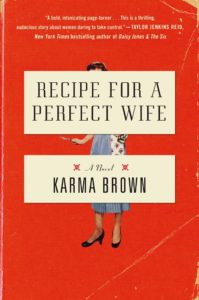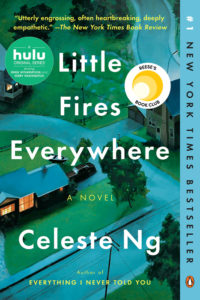Heroes are supposed to be likeable, right? With personalities and qualities for the rest of us to aspire to or admire. Not so much in novels, in particular in thrillers. While the flawed or unlikeable protagonist is nothing new in fiction, it seems that our modern times make us more willing to empathize with their struggles. Here are five thrilling novels with deeply flawed fictional characters we know you’ll learn to appreciate as you turn the pages.
Foe by Iain Reid
Foe is a masterclass in quiet intensity, and its married main characters are frustrating in their interactions and refusal to say what needs to be said. The narrator, Junior, seems too simplistic in his take on everything, and his wife Henrietta—Hen—comes off in the early pages as aloof, unkind, cold. But soon we learn more about their relationship, and the eerie events that force their stunted interactions. Fundamentally this is a thriller about relationships, and the more we see of Hen’s perspective, the more we understand her and the coldness that put us off at first. As the Los Angeles Times wrote, “Reid writes about the relationship so well that it becomes a universe full of questions and possibilities.” Famed director Charlie Kaufman’s adaptation of Reid’s first novel, I’m Thinking of Ending Things, releases on Netflix next month, so now’s the perfect time to get started on his backlist.
The “Detective Elouise Norton” series by Rachel Howzell Hall
Elouise “Lou” Norton is the star of Rachel Howzell Hall’s eponymous series of detective novels. A Black homicide detective in Los Angeles, Lou comes off as a confident powerhouse at work, but her struggles are laid bare on the home front. Her insecurities around her marriage and home life are frustrating to the reader at first, but ultimately lead us to ask a universal question: Why can’t our confidence in some areas of life translate well to others? By book three in the series readers will have such a profound affection and understanding of Lou, thanks in large part to Hall‘s strong character-building chops. As Kirkus writes in a starred review of the series’ second novel Trail of Echoes, Hall “gives voice to a rare figure in crime fiction: a highly complex, fully imagined black female detective.”
Hurry Home by Roz Nay
Some of the best thrillers begin with the notion of a ‘perfect’ life—a character who seems to have it all. Alexandra Van Ness falls squarely into this category, until her sister Ruth shows up and things unravel fast. Sisterhood is an excellent vehicle for Nay to bring out the worst in her characters, and the reader is torn between disbelief and a sense of empathy for them both. No one’s life is perfect, and no one’s past is clean—Nay makes these truths very clear to readers in this immensely satisfying sophomore novel.
Recipe for a Perfect Wife by Karma Brown
When main character Alice Hale quits her job to focus on writing and reluctantly moves with her husband to the suburbs, we get begin with the sense that Alice is simply ungrateful for all that she has. Alice soon finds a cookbook left behind by the house’s resident from 50 years earlier, and the reader discovers that the characters are not who they seem. Soon we find ourselves rooting for Alice, in large part because Brown does such great work in peeling back the layers of the different relationships in this novel, some more deeply fraught than others. Only in such a deft writer’s hands could a story about a couple, and a suburban house and its history, reads like a page-turning thriller.
Little Fires Everywhere by Celeste Ng
In this literary thriller, Celeste Ng pulls off a perfect coup in forcing the reader to shift allegiances between an entire cast of unlikeable, and yet uncomfortably relatable, characters. Mia Warren and Elena Richardson couldn’t be more different, so when their lives collide in the cozy Ohio suburbia of Shaker Heights, the reader quickly recognizes that both women are deeply flawed. At the core of our human nature is the understanding that we’re all capable of terrible or underhanded things in the name of protecting or avenging those we love, and this novel capitalizes on that truth in big ways. As the story moves forward, Ng delves far enough into both Mia and Elena’s pasts to tell us why they are the way they are, and even build some empathy for them. Recently adapted into a TV series by Reese Witherspoon, Little Fires Everywhere is no doubt a read-the-book first proposition.
*























